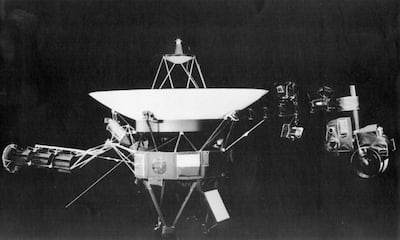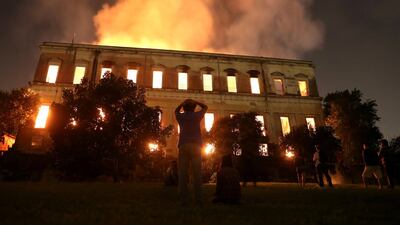When the Voyager missions were sent by Nasa on their grand tour of the solar system in 1977, they went into space with messages and photographs from Earth, in case either probe bumped into another civilisation.
Voyager 1 and Voyager 2, which are now both comfortably more than 10 billion miles away from home and still recording data, went into deep space with an eclectic set of images stored on a golden record, including photos of the Great Barrier Reef and rush hour traffic in Thailand. Those pictures were supplemented by a mixtape of music, welcome messages recorded in 55 languages, including "greetings to our friends in the stars" in Arabic, and a note composed by then US president Jimmy Carter. One day these windows onto our world may be discovered by another lifeform.
Earlier this month, another time capsule began accepting deposits again after a months-long pause triggered by this year’s pandemic.
Read More from Nick March
Imagined as a repository for the world's most important information, the Arctic World Archive on the Svalbard archipelago, which is midway between Norway and the North Pole, is a cold storage vault in which great works are being kept for future generations. The AWA is an off-the-grid, low carbon footprint and disaster-proof space set deep inside a disused coal mine.
Last week, Unicef deposited a copy of a petition of support, containing thousands of signatures for the UN Convention on the Rights of the Child, a duplicate of which is also kept in the facility. Several cultural entities made deposits at the same time, placing archived documents, literary works and art databases into the vault.
The project, which is run as a commercial operation, has been brought into life by Piql, a data preservation and digital film entity. The company says the deposits contribute to a richer picture of our era and serve to protect world memory for centuries to come.
The AWA’s intriguing location and cutting-edge digital film storage techniques could easily have been imagined on the pages of a Hollywood script, but the project’s broader impulse raises real-world questions about what should be preserved and for what purpose?
Much of global development walks a fine line between preservation and progress. Most UAE residents, for instance, are profoundly aware of that balance, as developers seek to improve our communities and weigh up what to hold onto and what to discard. It is a tough puzzle to solve.
The same goes for global memory more broadly. Much of history is written as an exercise in omission and compression. Plenty that should be kept is set aside or lost.
The Voyager missions bore the message of Mr Carter to other civilisations – his typewritten words noted that “we are attempting to survive our time so we may live into yours” – but which other presidential words should we keep for eternity?
Should we lay down the inspirational "slip the surly bonds of Earth" eulogy by Mr Carter's successor, Ronald Reagan, after the 1986 Challenger Space Shuttle disaster or Donald Trump's memo to the Proud Boys to "stand back and stand by" in last month's tetchy first US presidential debate? Both statements paint pictures of how we were and how life is now, even if they exist on sharply different points of the scale of acceptability or empathy.
The same is true of this year in general. What version of this year should we preserve for eternity: is it the community spirit of the early months of people sheltering at home or the protests in Europe against new restrictions of movement orders imposed in the autumn? Should we remember the failures of some world leaders in the pandemic or the compassion and decisiveness of others? A combination of the unequal parts good, bad and indifferent continuously shapes our world.
On a Zoom call a few days before this month’s deposit in the AWA, Rune Bjerkestrand, Piql’s managing director, talked to me about some of these issues.
Punctuated by the digital glitches that have become so familiar to us all in this year of bouncing from one videoconference call to another, the occasional fragility of the medium only served to underline the burden of responsibility that comes with preserving memory. Our world, both digital and real, is vulnerable. We live under near constant threat of loss of information, livelihoods and meaning, either by accident or sometimes by willful destruction.
Much of global development walks a fine line between preservation and progress. It is a tough puzzle to solve
Mr Bjerkestrand says that “we think the owners of the information should decide what’s important” but noted that the project has prompted deeper discussions about what is appropriate to curate and what has value for cultural heritage.
Around the same time as the AWA reopened, the Oreo biscuit company inaugurated its own Global Vault on Svalbard as an apparent marketing stunt to protect the brand's cookies from possible destruction by asteroid 2018VP1, a small fridge-sized rock that is expected to fall towards Earth in early November. Nasa tweeted in August that 2018VP1 poses no threat to the planet, so the brand is in no immediate danger of extinction, unless consumer tastes change rapidly.
But in a year when many people have lost more than they have gained, perhaps a heightened sense of protecting what we have is only natural – be it cookies or a UN charter. Facing the howling winds of the pandemic, self-preservation and a deeper commitment to conservation now seem like appropriate instincts in our wild world.
Nick March is an assistant editor-in-chief at The National
The Specs:
The Specs:
Engine: 2.9-litre, V6 twin-turbo
Transmission: 8-speed automatic
Power: 444bhp
Torque: 600Nm
Price: AED 356,580 incl VAT
On sale: now.
If you go
Where to stay: Courtyard by Marriott Titusville Kennedy Space Centre has unparalleled views of the Indian River. Alligators can be spotted from hotel room balconies, as can several rocket launch sites. The hotel also boasts cool space-themed decor.
When to go: Florida is best experienced during the winter months, from November to May, before the humidity kicks in.
How to get there: Emirates currently flies from Dubai to Orlando five times a week.
The specs
Engine: four-litre V6 and 3.5-litre V6 twin-turbo
Transmission: six-speed and 10-speed
Power: 271 and 409 horsepower
Torque: 385 and 650Nm
Price: from Dh229,900 to Dh355,000
Brahmastra%3A%20Part%20One%20-%20Shiva
%3Cp%3E%3Cstrong%3EDirector%3A%20%3C%2Fstrong%3EAyan%20Mukerji%3C%2Fp%3E%0A%3Cp%3E%3Cstrong%3EStars%3A%20%3C%2Fstrong%3ERanbir%20Kapoor%2C%20Alia%20Bhatt%20and%20Amitabh%20Bachchan%3C%2Fp%3E%0A%3Cp%3E%3Cstrong%3ERating%3A%3C%2Fstrong%3E%202%2F5%3C%2Fp%3E%0A
Jetour T1 specs
Engine: 2-litre turbocharged
Power: 254hp
Torque: 390Nm
Price: From Dh126,000
Available: Now
Key facilities
- Olympic-size swimming pool with a split bulkhead for multi-use configurations, including water polo and 50m/25m training lanes
- Premier League-standard football pitch
- 400m Olympic running track
- NBA-spec basketball court with auditorium
- 600-seat auditorium
- Spaces for historical and cultural exploration
- An elevated football field that doubles as a helipad
- Specialist robotics and science laboratories
- AR and VR-enabled learning centres
- Disruption Lab and Research Centre for developing entrepreneurial skills
What is type-1 diabetes
Type 1 diabetes is a genetic and unavoidable condition, rather than the lifestyle-related type 2 diabetes.
It occurs mostly in people under 40 and a result of the pancreas failing to produce enough insulin to regulate blood sugars.
Too much or too little blood sugar can result in an attack where sufferers lose consciousness in serious cases.
Being overweight or obese increases the chances of developing the more common type 2 diabetes.
UAE currency: the story behind the money in your pockets
Mobile phone packages comparison
Basquiat in Abu Dhabi
One of Basquiat’s paintings, the vibrant Cabra (1981–82), now hangs in Louvre Abu Dhabi temporarily, on loan from the Guggenheim Abu Dhabi.
The latter museum is not open physically, but has assembled a collection and puts together a series of events called Talking Art, such as this discussion, moderated by writer Chaedria LaBouvier.
It's something of a Basquiat season in Abu Dhabi at the moment. Last week, The Radiant Child, a documentary on Basquiat was shown at Manarat Al Saadiyat, and tonight (April 18) the Guggenheim Abu Dhabi is throwing the re-creation of a party tonight, of the legendary Canal Zone party thrown in 1979, which epitomised the collaborative scene of the time. It was at Canal Zone that Basquiat met prominent members of the art world and moved from unknown graffiti artist into someone in the spotlight.
“We’ve invited local resident arists, we’ll have spray cans at the ready,” says curator Maisa Al Qassemi of the Guggenheim Abu Dhabi.
Guggenheim Abu Dhabi's Canal Zone Remix is at Manarat Al Saadiyat, Thursday April 18, from 8pm. Free entry to all. Basquiat's Cabra is on view at Louvre Abu Dhabi until October
The Settlers
Director: Louis Theroux
Starring: Daniella Weiss, Ari Abramowitz
Rating: 5/5
What the law says
Micro-retirement is not a recognised concept or employment status under Federal Decree Law No. 33 of 2021 on the Regulation of Labour Relations (as amended) (UAE Labour Law). As such, it reflects a voluntary work-life balance practice, rather than a recognised legal employment category, according to Dilini Loku, senior associate for law firm Gateley Middle East.
“Some companies may offer formal sabbatical policies or career break programmes; however, beyond such arrangements, there is no automatic right or statutory entitlement to extended breaks,” she explains.
“Any leave taken beyond statutory entitlements, such as annual leave, is typically regarded as unpaid leave in accordance with Article 33 of the UAE Labour Law. While employees may legally take unpaid leave, such requests are subject to the employer’s discretion and require approval.”
If an employee resigns to pursue micro-retirement, the employment contract is terminated, and the employer is under no legal obligation to rehire the employee in the future unless specific contractual agreements are in place (such as return-to-work arrangements), which are generally uncommon, Ms Loku adds.
AVOID SCAMMERS: TIPS FROM EMIRATES NBD
1. Never respond to e-mails, calls or messages asking for account, card or internet banking details
2. Never store a card PIN (personal identification number) in your mobile or in your wallet
3. Ensure online shopping websites are secure and verified before providing card details
4. Change passwords periodically as a precautionary measure
5. Never share authentication data such as passwords, card PINs and OTPs (one-time passwords) with third parties
6. Track bank notifications regarding transaction discrepancies
7. Report lost or stolen debit and credit cards immediately
Killing of Qassem Suleimani
'Champions'
Director: Manuel Calvo
Stars: Yassir Al Saggaf and Fatima Al Banawi
Rating: 2/5
More on animal trafficking




